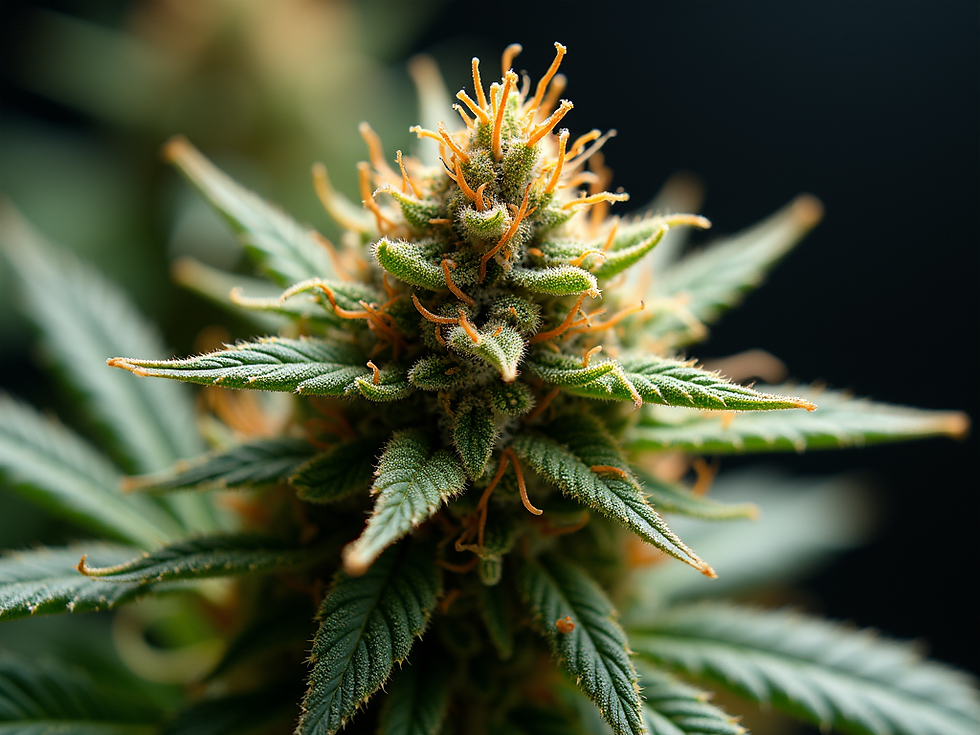Exploring the Key Differences Between THCA and THC
- Smoke Central Hemp

- Sep 26, 2025
- 4 min read
The cannabis plant is known for its diverse range of compounds that interact with the human body in various ways. Among these compounds, THC (tetrahydrocannabinol) is the most well-known for its psychoactive effects. However, there's another compound gaining attention: THCA (tetrahydrocannabinolic acid). While both compounds are derivatives of the cannabis plant, they have distinct characteristics that affect how they interact with consumers. In this post, we'll dive deep into the key differences between THCA and THC.
THC Variations
To understand the differences between THCA and THC, it's essential to first look at the variations of THC itself. THC is primarily recognized for its psychoactive properties, which produce a "high" when consumed. However, THC has several variations, including Delta-8 THC and Delta-10 THC. Each variant comes with its own set of effects and legal statuses.
Delta-9 THC
Delta-9 THC is what most people refer to when discussing THC. It is the primary psychoactive compound in cannabis and has been the subject of numerous studies due to its effects, medical benefits, and legal ramifications. Delta-9 THC binds to the CB1 and CB2 cannabinoid receptors in the brain and body, leading to various psychological and physical effects, including relaxation, euphoria, and an altered sensory perception.

Delta-8 and Delta-10 THC
Delta-8 THC has emerged as a milder alternative to Delta-9 THC. It activates the same CB1 receptors but with different intensity, producing less potent psychoactive effects. Users describe Delta-8 as inducing a more clear-headed high with less anxiety, making it appealing for those who want the benefits of THC without overwhelming effects.
Delta-10 THC is even less psychoactive and is often characterized by feelings of euphoria and excitement without significant impairment. This makes it an attractive option for those looking for a balanced experience.
Both Delta-8 and Delta-10 THC provide valuable alternatives for consumers interested in exploring the various effects of THC.
Understanding THCA
THCA is the non-psychoactive precursor to THC. It exists in the cannabis plant in its raw form and converts to THC through a process known as decarboxylation, which occurs when the plant is heated or cured. As a result, THCA is prevalent in raw cannabis and many cannabis edibles that haven’t been heated during preparation.
Unlike THC, THCA does not bind to the CB1 receptors in the brain, meaning it does not produce a high. Many consumers are drawn to THCA for its potential medicinal properties, as research indicates it may possess anti-inflammatory, neuroprotective, and anti-emetic effects.

Does THCA Turn into THC?
Yes, THCA can turn into THC, but only under certain conditions. When cannabis is heated through methods like smoking, baking, or vaporizing, decarboxylation occurs. This process removes the acidic group from THCA, converting it into THC.
This transformation is crucial for those seeking the psychoactive effects of THC. Without this process, THCA remains inactive. Therefore, using raw cannabis products will not provide the same effects as consuming products that have been heated or cured.
Therapeutic Benefits of THCA vs THC
Both THCA and THC offer valuable therapeutic benefits, but they cater to different needs and preferences of consumers.
THCA for Medical Use
Research suggests that THCA may help with a range of medical issues without causing the high associated with THC. For example, THCA is being studied for its potential to reduce inflammation, control nausea, and stimulate appetite. This makes it a promising option for patients looking to alleviate symptoms without impairment.
THC for Recreational and Medical Use
On the other hand, THC is widely used both medically and recreationally. It can help manage chronic pain, anxiety, and depression, providing a sense of relaxation or euphoria. However, the psychoactive effects can be too intense for some, leading many to seek alternatives like THCA or Delta-8 THC.

Conclusion: Choose the Right Compound for Your Needs
In the battle of THCA vs THC, the right choice ultimately depends on individual preferences and needs. For those looking for psychoactive effects, THC variants like Delta-9, Delta-8, or Delta-10 may be more suitable. Conversely, if you're interested in the potential health benefits without the high, THCA could be the ideal choice.
To summarize, understanding the differences between THCA and THC can empower consumers to make more informed decisions about their cannabis use. Whether for medicinal or recreational purposes, knowing how each compound works can help you explore the myriad opportunities available in the cannabis world.
This exploration of THCA and THC reveals profound implications for how we perceive and use cannabis. As research continues to unfold, we may discover even more about these compounds and their effects on the human body. Understanding the subtleties between these variations could lead to more personalized experiences in your cannabis journey. For a deeper dive into the intricacies of thca vs thc, feel free to explore additional resources available online.



